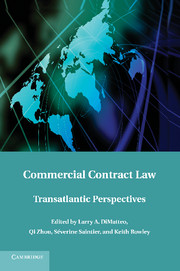Book contents
- Commercial Contract Law
- Commercial Contract Law
- Copyright page
- Dedication
- Brief Contents
- Contents
- Contributors
- Foreword
- Part I The Role of Consent
- 1 Transatlantic Perspectives
- 2 Competing Theories of Contract
- 3 Contracts, Courts, and the Construction of Consent
- 4 Are Mortgage Contracts Promises?
- Part II Normative Views of Contract
- Part III Contract Design and Good Faith
- Part IV Implied Terms and Interpretation
- Part V Policing Contracting Behavior
- Part VI Misrepresentation, Breach, and Remedies
- Part VII Harmonizing Contract Law
- Index
4 - Are Mortgage Contracts Promises?
from Part I - The Role of Consent
Published online by Cambridge University Press: 05 February 2013
- Commercial Contract Law
- Commercial Contract Law
- Copyright page
- Dedication
- Brief Contents
- Contents
- Contributors
- Foreword
- Part I The Role of Consent
- 1 Transatlantic Perspectives
- 2 Competing Theories of Contract
- 3 Contracts, Courts, and the Construction of Consent
- 4 Are Mortgage Contracts Promises?
- Part II Normative Views of Contract
- Part III Contract Design and Good Faith
- Part IV Implied Terms and Interpretation
- Part V Policing Contracting Behavior
- Part VI Misrepresentation, Breach, and Remedies
- Part VII Harmonizing Contract Law
- Index
Summary
This chapter addresses the issue of whether strategic mortgage defaults are immoral. In a strategic default a homeowner defaults on his mortgage contract even though he could afford to make the payments with relative ease – a decision that may sometimes make financial sense when property values have declined so much that a borrower owes more on a home mortgage than the home is worth. The initial premise seems rather obvious: that homeowners who had borrowed hundreds of thousands of dollars, promised to pay it back, and were able to pay it back quite easily should actually do so unless someone could show otherwise.
However, there are numerous critics of the preceding proposition. Many critics felt that either the contracts in question did not contain promises, or else they contained a merely “business” arrangement that could be broken at any time so long as one was willing to suffer the consequences, especially in states where the remedies upon default were limited. What seems odd about these arguments is that they ignored the specific language in the contracts whereby the borrower explicitly promises to pay back the amount borrowed plus interest. Much more attention was paid to the remedies available in the event of breach, or in some cases the language of other contracts that allowed promisors to cancel by paying a fee. That focus makes sense for a legal argument, but it seems that anyone interested in the moral obligation could not ignore the explicit promise.
This chapter analyses the argument that these contracts do not contain promises despite the explicit promissory language. Very briefly put (for now), the reason is that a promise, according to one leading way of thinking, is by definition a situation when a person knowingly undertakes a moral commitment to do (or refrain from doing) a certain deed and in so doing invites the promisee to trust that she will do that deed. Importantly, the trust involved in promising is a special sort of trust. In promising, the promisor invites the promisee to believe that the promisor not only will do the deed, but that the promisor also sees herself as taking on a moral commitment to do the deed, and that for that reason the promisee can trust that the promisor will do the deed.
There was a time, the author believes, when mortgage contracts were promises in this sense. When borrowers were more likely to borrow from a local bank and make their promise to a local banker who was likely to hold the mortgage, borrowers likely saw themselves as taking on a moral commitment. The chapter argues that borrowers are more likely to see themselves as merely assuring lenders that they can be trusted because they are taking on a legal commitment, with legal consequences. Although mortgage contracts still contain promissory language, that alone is not sufficient to constitute a promise. What is required is a context that makes clear that the would-be promisor is offering assurances that she sees herself as morally committed, not just subject to sanctions. In today’s world of mortgage brokers, remote mortgage holders, and impersonal credit scores, borrowers are much more likely to see themselves as merely making themselves vulnerable to legal sanctions. Whether strategic default is morally defensible is, of course, a further question. But if it is, it may be because borrowers are simply not making promises in the relevant sense.
- Type
- Chapter
- Information
- Commercial Contract LawTransatlantic Perspectives, pp. 67 - 82Publisher: Cambridge University PressPrint publication year: 2013

